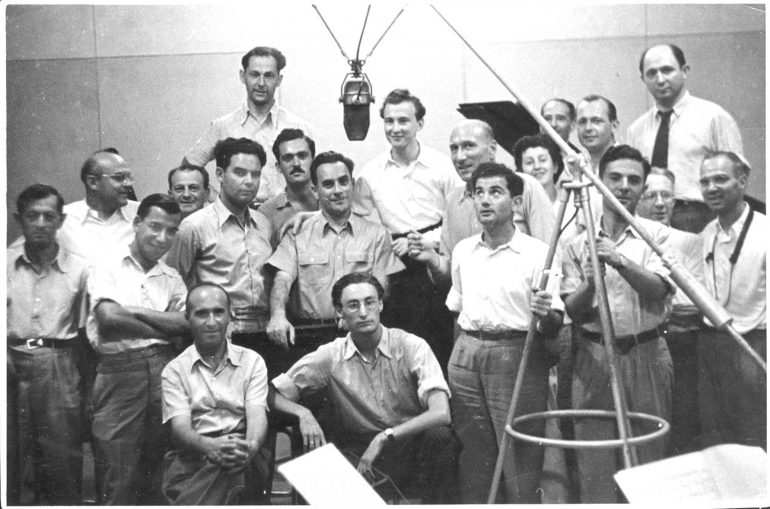History
The story of the Orchestra
On March 30, 1936, the voice of the postmaster general Colonel Hudson burst into the ether, announcing for the first time “This is Jerusalem Calling”, followed by a Hebrew translation and a speech by the High Commissioner Sir Arthur Grenfell Wauchope, who officially inaugurated the Palestine Broadcasting Service. Music was part of public broadcasted content from its very inception, even more so in the years of the British Mandate, since the admitted policy was not to involve any political content whatsoever. The first musical sounds that were heard on that occasion were those of the piano of Erich (Aryeh) Sachs, who played an introduction to a song sung by Chaim Vittorio Weinberg.
.
Initially, the musical needs of the young radio station were supplied by the small Chamber Orchestra of the Palestine Broadcasting Service, which was directed by the singer-conductor Kar’el Salmon (originally Karl Salomon). Apart from fulfilling these necessary musical obligations, in a true visionary and pioneering fashion, the ensemble set itself to pave the way and establish the ground for future musical activity in Jerusalem. Appropriately, their 1938 program included a Christmas concert given in the Y.M.C.A and conducted by Oxford conductor Crawford McNair, as well as the Palestinian première of Schumann’s Concerto for Violin, with the solo part played by Sasha Parnes, and special programs featuring works from local composers living in Palestine. In 1938, these works included Suites for Strings by Verdina Shlonsky, Joseph Tal (Gruenthal) and Mordecai Seter (Staromirsky), Variations on a Palestinian Song by Salmon, and a “Berceuse” for strings by Peter Gradenwitz.
.
In 1938, Salmon and McNair reorganized the ensemble and formed the Palestine Broadcasting Service Orchestra, among whose founding members one can mention: Sasha Parnes as the concertmeister; Wolfgang Schoeken and Frankel as second violins; Chanoch (Heinrich) Jacoby, who was a pupil of Hindemith, as well as Jenny Schmerzler, and Arieh Mirkin on violas; Daniel Horfmäkler on cello; flutist Wlihelm von Blaise; and Shabtai Petrushka on brass instruments. In 1939 the orchestra began its weekly concerts at the YMCA, where they were held until 1975, long after it was renamed the Kol Israel (Israeli Broadcasting Association) Orchestra in 1948.
.
The Jerusalem Symphony Orchestra played a crucial role in shaping and developing the cultural sphere of the newly formed state. Much in the spirit of the original small ensemble, the orchestra emphasized the commissioning and performance of modern works, both Israeli and foreign, and combined both local soloists and conductors with guest artists.
.
Outstanding among its conductors were Michael Taube, Georg Singer, Otto Klemperer, Heinz Freudenthal, Shalom Ronly-Riklis, Mendi Rodan, Lawrence Foster, Yoav Talmi, Sergiu Comissiona, Lukas Foss, Gary Bertini and David Shallon. Works that had their première in Jerusalem include David (Milhaud, 1954), Abraham and Isaac (Stravinsky, 1964) and Exhortatio (Dallapiccola, 1971), also and works by Sophia Gubaidulina, Henri Dutilleux and Alfred Schnittke.
.
Over the years, the Jerusalem Symphony Orchestra, saw breathtaking guests performances from some of the greatest luminaries of recent generations, including Arthur Rubinstein, Igor Markevitch, Henryk Szeryng, Isaac Stern, Radu Lupu, Peter Schrier, Tabea Zimmerman and Yefim Bronfman. In recent years, one of the most notable premieres performed by the orchestra was The Seven Gates of Jerusalemby Polish composer Krzystof Penderecki, conducted by Maestro Lorin Maazel, which was composed for the finale of the Jerusalem 3000 celebrations.
.
Throughout the years the orchestra produced the Liturgical Festival, founded by Maestro Gary Bertini, who also extended the scope of the orchestra and its repertoire by extending the number of musicians from around fifty to ninety.
.
Since its inception, the orchestra has had eight Musical Directors: Mendi Rodan, Lukas Foss, Lawrence Foster, Gary Bertini, David Shallon, Leon Botstein and Frédéric Chaslin. The current Music Director of the orchestra is Maestro Steven Sloane.
.
The JSO as a cultural ambassador
.
The tradition of such great musical moments continues to this day. The orchestra is frequently invited to conduct concert tours throughout the world and has performed at prestigious venues such as the Carnegie Hall, The Musikverein in Vienna, the Kölner Philharmonie, and concert halls in Düsseldorf, Frankfurt and Lucerne. June 2009 saw the JSO perform Mendelssohn’s Elijah at the finale concert of the annual Bach Festival in Leipzig to rave reviews.
.
In February 2015 the JSO performed Shostakovich’s Symphony No. 13, Babi-Yar, at the UNESCO Headquarters in Paris, commemorating 70 Years since the liberation of Auschwitz. In August of the same year the JSO embarked on a tour in Brazil, with Maestro Chaslin and violinist Itamar Zorman. In January 2016 the JSO flew over to the US, while in November of the same year the JSO performed 13 concerts in Japan.
.
An extensive South-American tour followed in August 2018 under Maestro Yeruham Scharovsky – with concerts performed in Brazil, Argentina, Chile and Peru. Maestro Andres Mustonen led the JSO’s tour of Latvia and Estonia, while in June 2020 current Music Director Steven Sloane led the orchestra’s tour in Germany, with concerts held in Berlin, Hamburg and Bochum. In September 2021 the JSO became the first Israeli orchestra to perform in Dubai – performing four concerts in the frame of the InClassica Festival.
